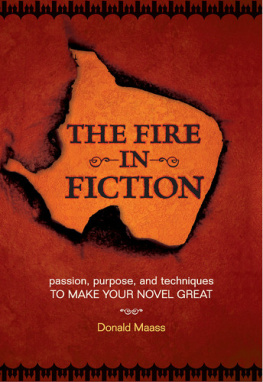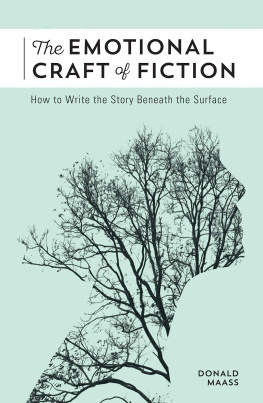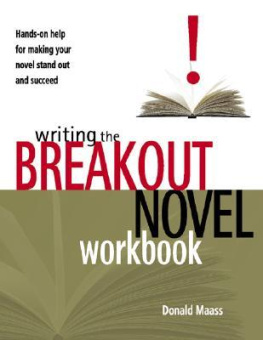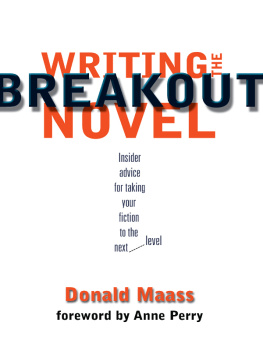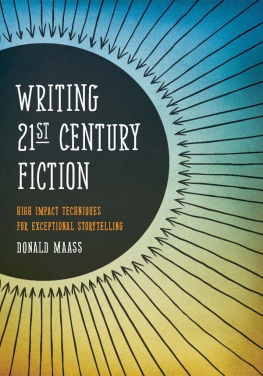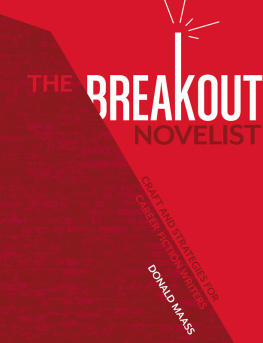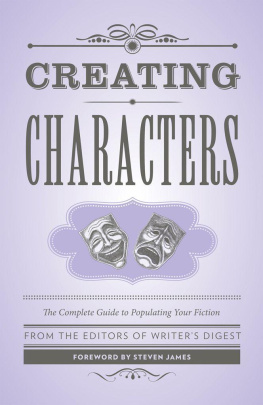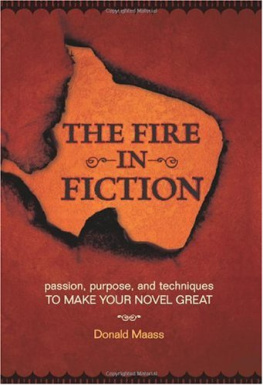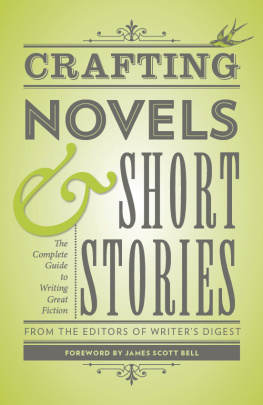


INTRODUCTION
Status Seekers and Storytellers
Playing With Fire
CHAPTER 1 Protagonists vs. Heroes
Average Joes, Jane Does, and Dark Protagonists
Cutting Heroes Down to Size
Greatness
Protagonists vs. Heroes
Practical Tools
CHAPTER 2 Characters Who Matter
Special
Ordinary
Antagonists
Practical Tools
CHAPTER 3 Scenes That Can't Be Cut
Outer and Inner Turning Points
Dialogue
Striding Forward, Falling Back
First Lines, Last Lines
The Tornado Effect
Practical Tools
CHAPTER 4 The World of the Novel
Linking Details and Emotions
Measuring Change Over Time
History is Personal
Seeing Through Characters' Eyes
Conjuring a Milieu
Setting as a Character
Practical Tools
CHAPTER 5 A Singular Voice
Giving Characters Voice
Details and Delivery
Different Ways of Relating a Story
Practical Tools
CHAPTER 6 Making the Impossible Real
The Skeptical Reader
Making Characters Afraid
Focus on Villains
Verisimilitude: Pseudoscience, Genuine Facts
Scary Monsters
Practical Tools
CHAPTER 7 Hyperreality
The Secrets of Satire
Funny People, Funny Places
Sending Up Society
Funny Voices
Practical Tools
CHAPTER 8 Tension All the Time
Tension in Dialogue
Tension in Action
Tension in Exposition
Transforming Low-Tension Traps
Tension Where There Is None
Practical Tools
CHAPTER 9 The Fire in Fiction
Our Common Experience
Our Uncommon Experiences
The Moral of the Story
The Fire in Fiction
Practical Tools
INDEX

INTRODUCTION
We've all read them: the sixth novel in a mystery series that disappoints, the splashy-looking hardcover that proves to be empty inside, the latest novel by a favorite author that is just plain off. We wonder what went wrong. Was the author rushed, or not edited, or maybe just not trying?
Lackluster stories turn up every day, too, in the submissions sent to my literary agency in New York. The manuscripts of published and unpublished authors alike too often lie flat on the page. They fail to engage, to excite my imagination. Feeling little for the characters and unenthusiastic about where the story may go, I scribble notes for my rejection letters.
Then there are those manuscripts that effortlessly lift off. From the first sentence, I am immediately drawn into the world of the story. The protagonist is someone about whom I immediately care. Secondary characters come alive, and even the antagonist surprises me. I cannot help but read every page as the author unfolds his purpose, whether it is to scare me, to satirize, to uplift me, or just to amaze me.
No doubt you have felt that way about one published novel or another. You may also have noted with envy that the publisher got behind that lucky book. You can tell that from the gorgeous cover and the book's front-of-store placement. Reviewers also gush, declaring that it's her best ever.
What is it that puts authors at the top of their game? Is it the result of accumulated craft, experience reaped, confidence built over
twenty or more books? Is it a sage suggestion from a veteran agent or editor? Why not tackle thus-and-such subject?
Masterpiece novels look like singular events. We imagine that this novel is the story that the author has been burning to write. He's been saving it up, planning it for years, worked on it for a decade between delivering lesser works. In our more envious moments we may imagine that this corker was born from a one-time lightning flash of inspiration.
I don't buy that. A lightning flash bright enough to light four hundred pages? A suggestion so brilliant that forty or more elegantly shaped scenes flow easily onto the page? A decade-long project that did not ever once grow stale?
A masterpiece novel may be singularly inspired, and it certainly can be a once-in-a-career event. But even so, it is not magic. It may feel that way to the author. He may hype its close-to-my-heart genesis and confess in The Writer or on NPR that the manuscript wrote itself.
It disappoints me when authors perpetuate the myth that writing is magic. Some allow it to be so. It's a shame that those writers fail to understand their own process. What's wrong with that? What's wrong is simply that magic is unpredictable. A method that's mysterious cannot be repeated.
I believe that passion is available to every author, every time she sits down to write. Every novel can be inspired. Every scene can have a white-hot center. It is not a matter of conjuring demons, being obsessed, or just plain luck. The passion that inspires great fiction can be a writing technique as handy and easy to use as those with which all fiction writers are familiar. Passion can be a practical tool.
What do I mean by passion? Simply put, it is the underlying conviction that makes the words matter. It is the burning drive to urgently get down something specific, something that the reader has to see. It could be as big as a universal truth about human nature or as small as the quality of the light on an autumn afternoon on the Nebraska prairie.
Whatever it is, the words flow, or seem to, and as readers we are blown away by the author's precision and emotional force. A
passionate author has us in her grip. Passionate fiction is not bogged down, wandering, low in tension, or beset by the many bugbears of by-the-numbers novel writing, like stereotypical characters, predictable plots, cliche-ridden prose, churning exposition, buried dialogue, and so on.
Passionate writing makes every word a shaft of light, every sentence a crack of thunder, every scene a tectonic shift. When the purpose of every word is urgent, the story crackles, connects, weaves, and falls together in wondrous ways. No wonder such novels feel as if they are writing themselves. Actually, it is the author who has found a groove. Wouldn't it be nice if every manuscript flowed so easily?
STATUS SEEKERS AND STORYTELLERS
Why do some novels by published writers go wrong? To start to answer that question, I think we must first go back to the beginning and examine the two primary reasons why people write fiction.
For thirty years I have observed fiction careers. I've seen them succeed and fail. The more I see, the more I feel that novelists fall into two broad categories: those whose desire is to be published, and those whose passion is to spin stories. I think of these as status seekers and storytellers.
It can be tough to tell the difference, at least at first. Before their first contract, most fiction writers will urgently tell me what they believe I want to hear: I am totally committed to making it, to being the best writer I can be, no matter what it takes. I want to achieve excellence.
I believe such sentiments are sincere but I have learned to take them with a grain of salt. It is over time that I discover an author's true motivation for writing. Authors themselves may not know, and all have a mixture of motives. Still, their primary reasons for writing will ultimately emerge.
Next page
